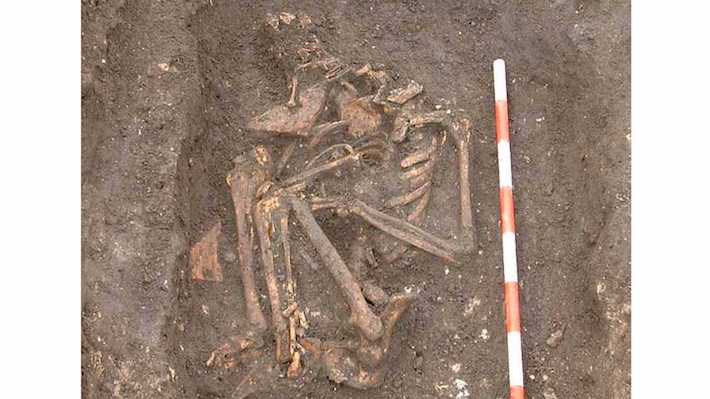 SHEFFIELD, ENGLAND—According to a statement released by the University of Sheffield, researchers led by osteoarchaeologist Lauren McIntyre have identified the remains of a woman held in the collections at the University of Sheffield as Lady Isabel German, who is known to have been an anchoress, or a woman who chose to live a life of prayer in seclusion. Documents show that Lady German lived in a single room at All Saints Church in Fishergate, York, in the fifteenth century. The bones, unearthed in 2007, were found in a tightly crouched position within the apse of the All Saints Church foundations. Radiocarbon dating of the remains and analysis of the chemical makeup of the bones also support the identification. McIntyre said the woman suffered from septic arthritis and advanced venereal syphilis. “The new study allows us to explore the possibilities that Lady German chose to devote herself to a life of solitude as a way to remain autonomous and in control of her own destiny,” she commented. “This chosen lifestyle would also have made her a highly significant figure within the local community, and she would have been viewed almost like a living prophet,” McIntyre concluded. To read about the probable remains of an Anglo-Saxon princess who helped found the first English nunnery, go to "ID'ing England's First Nun."
SHEFFIELD, ENGLAND—According to a statement released by the University of Sheffield, researchers led by osteoarchaeologist Lauren McIntyre have identified the remains of a woman held in the collections at the University of Sheffield as Lady Isabel German, who is known to have been an anchoress, or a woman who chose to live a life of prayer in seclusion. Documents show that Lady German lived in a single room at All Saints Church in Fishergate, York, in the fifteenth century. The bones, unearthed in 2007, were found in a tightly crouched position within the apse of the All Saints Church foundations. Radiocarbon dating of the remains and analysis of the chemical makeup of the bones also support the identification. McIntyre said the woman suffered from septic arthritis and advanced venereal syphilis. “The new study allows us to explore the possibilities that Lady German chose to devote herself to a life of solitude as a way to remain autonomous and in control of her own destiny,” she commented. “This chosen lifestyle would also have made her a highly significant figure within the local community, and she would have been viewed almost like a living prophet,” McIntyre concluded. To read about the probable remains of an Anglo-Saxon princess who helped found the first English nunnery, go to "ID'ing England's First Nun."
Medieval Remains Identified in England
